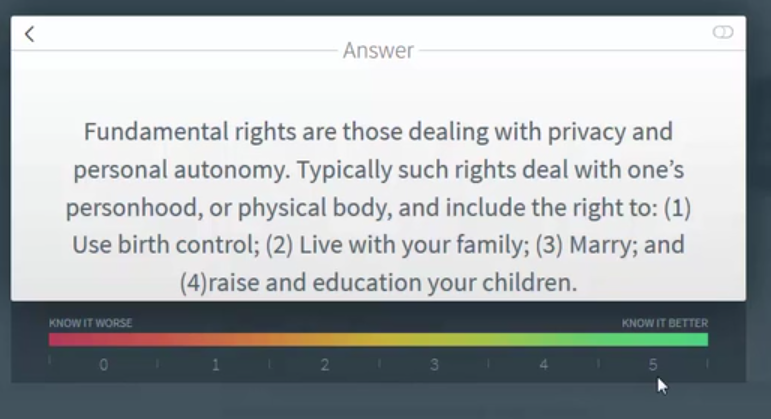A startup founded by a law professor is using algorithms to help law students get better class grades and pass the bar examination.
Called SeRiouS, or just SRS, it uses the learning technique of spaced repetition to help students remember much more of what they study. The company projects that students using its software will remember 92 percent of the material they study, compared to typical retention rates of less than a third.
The system uses a combination of modern-day algorithms and time-tested flash cards, according to the company’s founder, Gabriel H. Teninbaum, professor of legal writing at Suffolk University Law School and director of the school’s Institute on Law Practice Technology & Innovation.
“SpacedRepetition.com is a tool that maximizes law students’ learning by using a special algorithm that tells them just the right moment to study,” Teninbaum says. “Users learn about 3x as much information in less time, and they can do it all from their iPhone.”
Spaced repetition, according to Wikipedia, “is a learning technique that incorporates increasing intervals of time between subsequent review of previously learned material in order to exploit the psychological spacing effect.”
Based on that principle, SRS uses various sets of flashcards to help students with learning. As students go through each flashcard, they grade themselves on how well they know the answer. Based on that grading, the SRS algorithm schedules the next time to show the student that card.
In each session, the student is presented with a small set of cards to review. As the system presents each card, the student is asked to think through the answer. The student then clicks the card to flip it and reveal the answer. The student then self-evaluates how well he or she knew the answer and clicks a scale under the card that rates the answer from 0 to 5, from “know it worse” to “know it better.”
Based on the answers, the algorithm determines when next to show the student that card.
Science has proven the effectiveness of this method, the company says:
The scientific research has repeatedly proven spaced repetition’s effectiveness. One Harvard study found medical students preparing for licensure exams remembered nearly three times as much using spaced repetition over those that did not. Our algorithm improves upon the algorithm in that study, so that when compared against the typical forgetting curve retention at one month, 21%, our users remember nearly four times as much (92%). A separate meta-analysis summarizing over fifty twentieth century studies of spaced repetition showed that users improved testing results by at least half a standard deviation by use of spaced repetition.
SRS offers subscribers access to various types of flashcard decks. A featured Boost Deck contains more than 600 flash cards created by law professors and keyed to the bar exam and first-year law topics. Subscribers can also create and share their own decks keyed around specific courses and topics. There are more than 44,000 user-created cards, according to Teninbaum. Another deck, developed in partnership with the Wysebridge Patent Bar Review, helps prepare for the patent bar exam.
User-created decks are sorted within the system by school, course names and professor, so a user searching for a deck can first select a school and then a course at that school and then the specific professor. Users can also opt to keep their decks private or to share them only with selected other users. Users also have the option of creating decks collaboratively.
Users can also create decks keyed to specific states’ bar exams.
SRS offers free access to its MPRE deck and seven-day free trials of its paid plans. It has two primary paid plans. The create-and-share plan, by which students can build and share their own decks, is $5 a month. The Boost Deck plan, providing access to the Boost Deck, is $99 a year.
More information:
 Robert Ambrogi Blog
Robert Ambrogi Blog